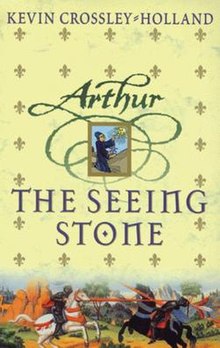The Seeing Stone

Front cover of first edition
|
|
| Author | Kevin Crossley-Holland |
|---|---|
| Cover artist | Marc Adams |
| Country | United Kingdom |
| Language | English |
| Series | Arthur trilogy |
| Genre | Children's historical fantasy |
| Publisher | Orion Publishing Group |
|
Publication date
|
August 2000 |
| Media type | Print (hardback & paperback), audiobook (tape and CD) |
| Pages | 324 pp (first edition) |
| ISBN | |
| OCLC | 44915913 |
| LC Class | PZ7.C88284 Sf 2001 |
| Followed by | At the Crossing-Places |
The Seeing Stone, or Arthur: The Seeing Stone, is a historical novel for children or young adults, written by Kevin Crossley-Holland and published by Orion in 2000, the first book of the so-called Arthur trilogy (2000 to 2003). Set primarily in the March of Wales during A.D. 1199 and 1200, it features a young boy named Arthur de Caldicot who observes a secondary story in the "Seeing Stone", the early life of legendary King Arthur. Crossley-Holland and The Seeing Stone won the annual Guardian Prize and Tir na n-Og Award.
The trilogy is a contemporary retelling of Arthurian legend, told by Arthur de Caldicot as a first-person narrative, where both the primary and secondary settings contribute to the retelling.
The story begins in the year 1199, just before the beginning of the Fourth Crusade. Young Arthur de Caldicot, thirteen years of age at the time, is the second son of a knight living in Caldicot manor in the "Middle Marches" of the March of Wales. Most of the first book deals with the stresses associated with medieval life. Most important to Arthur is the fact that he is Sir John's second son, and thus ineligible to inherit land. To have a life of his own, he must become a squire and then a knight, and create his own manor and farmland. One challenge to overcome is his inadequate "yard-skills", especially jousting and swordplay. He is left-handed, considered a dangerous oddity in those days, but he must joust and fence with his off-hand. Another challenge is that his father would make him a scribe for his skill reading and writing. The obstacles disappear when he learns on his fourteenth birthday that his "uncle" Sir William de Gortanore is really his father; he becomes heir to a large manor. Unfortunately, it seems that his mother's husband was murdered by Sir William, who was jealous of him. And the revelation terminates the betrothal of Arthur and Grace, Sir William's daughter; as Grace is Arthur's half-sister they cannot marry. The novel ends with Arthur accepted as squire to the Lord of the Middle Marches, Stephen de Holt.
...
Wikipedia
